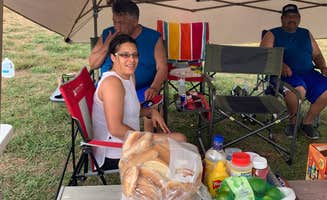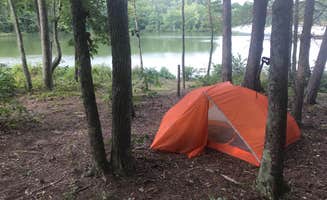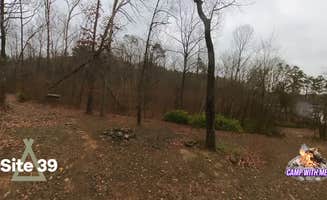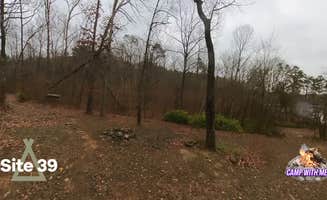Tent camping near Southmont, North Carolina offers primitive camping opportunities throughout the Uwharrie National Forest at elevations ranging from 350 to 1,000 feet. The forest's 51,000 acres feature mixed hardwood forests with pine stands and small streams feeding into the Yadkin and Pee Dee Rivers. Fall and early spring camping provides moderate temperatures in the 50-70°F range with notably less competition for the limited primitive sites.
What to do
Fishing opportunities: Several campgrounds provide direct water access for fishing. At Deep Water Trail Camp, one camper reported catching "channel cats" including "one enormous female catfish we released because she had eggs on board." The camp provides river access for bank fishing within walking distance of campsites.
Wildlife observation: The Uwharrie forests support diverse wildlife populations year-round. At Uwharrie Hunt Camp, campers can explore hiking trails around the lake where one visitor noted: "It is very quiet and enjoyable. Hung my hammocks from nearby trees and slept very well. Doing a little scouting for the upcoming hunting season."
Rock collecting: The Uwharrie Mountains contain significant mineral deposits accessible to campers. One visitor to Deep Water Trail Camp mentioned: "The big pieces of quartz we found were gorgeous, and so was the view at the water!"
What campers like
Off-season solitude: March through early April offers the quietest camping experience with minimal crowds. A camper at Lake Curriher Wilderness noted: "It's the quietest stay we've had yet, and we go camping nearly every weekend." Another camper at Uwharrie Hunt Camp described it as "FREE. large size nobody else here in March but I'm sure as summer rolls around it fills up more."
Budget-friendly options: Most primitive sites in the area are either free or low cost. Uwharrie Hunt Camp costs just $5 per night and includes basic amenities. One camper was pleasantly surprised, writing: "$5 per night...What? What?" noting that the "campground is a quaint" area with "only 6 sites."
Waterfront locations: Many campers value sites directly adjacent to water. At Deep Water Trail Camp, a visitor explained: "We stayed at a campsite next to the river bend, not on the actual Deep Water Trail, because it got super bumpy & didn't want to damage our car. But it gave us a nice path downward to get to the Yadkin River."
What you should know
Vehicle clearance requirements: Many primitive camping areas require high-clearance vehicles. At Deep Water Trailt Horse Camp, a camper warned: "I would highly recommend 4WD if you're going all the way to the water sites. I attempted in my van and made it down to a sweet spot, but was stuck in the mud." Road conditions worsen after rain.
Limited facilities: Most primitive sites lack basic amenities. One camper at Deep Water Trail Horse Camp noted a "Rough road in. Too much trash left by previous campers." Bring trash bags and pack out all waste as garbage service is not available at most primitive sites.
Cell service limitations: Connectivity varies significantly between sites. At Deep Water Trail Horse Camp, a camper reported: "Cell service is about 1 bar for Verizon and ATT" which may be important for emergency communications or work requirements.
Tips for camping with families
Safety precautions: Scout campsites before bringing children. A Lake Curriher Wilderness camper mentioned: "The gates close at 5pm during the fall/winter. Slightly around that time, the retired police chief came around to introduce himself and give his cell number. He is just up the street and was kind to offer this for extra safety."
Pet-friendly options: Most primitive sites allow pets with proper management. At East Morris Mountain Camp, visitors can find "Only three sites on this little out of the way fire trail" where many bring dogs due to the seclusion.
Water recreation: Many campgrounds offer swimming and wading opportunities. One camper at Deep Water Trail Camp mentioned: "We brought our two pups & they had a blast playing & laying in the water!" Supervise children closely as areas lack lifeguards or designated swimming zones.
Tips from RVers
Site selection for small trailers: Most primitive sites accommodate small trailers only. At Yates Family Camping, a camper noted: "There aren't really any extras here but if you're just looking for reliable water/electrical/sewer and wifi near Charlotte this is a fantastic option." This provides a more developed alternative when primitive camping isn't suitable.
Seasonal considerations: Winter camping requires additional preparation. One Yates Family Camping visitor reported: "Well not much here, no office or bathrooms. Water and electric and a dump station." During colder months, RVers should verify which facilities remain operational.
Backup plans: Have alternative sites ready if primary destinations prove inaccessible. At Deep Water Trail Camp, a camper advised: "Like the one review above said the drive down/up is a little sketchy but if your vehicle doesn't sit super low you should be able to make it with only a couple minor bottom outs."





